Always in the Fight | Brandon Holiday
Brandon Holiday contacted Thin Blue Line USA a few years ago wanting to buy a t-shirt with the small Thin Blue Line American Flag logo that would later be used on the hard covering of his prosthetic. Andrew, the President of Thin Blue Line USA, found out about this after having several conversations with Brandon. Prosthetic Orthotic Solutions International (POSI) was the company that had created a special technique where they could cut out the logo from our t-shirt and laminate it to an outer shell of a prosthetic. POSI turned Brandon’s prosthetic into a masterpiece, and it was pretty amazing. Intrigued, Andrew wanted to see the final results and asked for pictures when the job was done. Brandon shared the pictures and the results were worth posting on our Facebook page. In 2016, Andrew posted the pictures of Brandon’s new prosthetic and shared it with our followers.
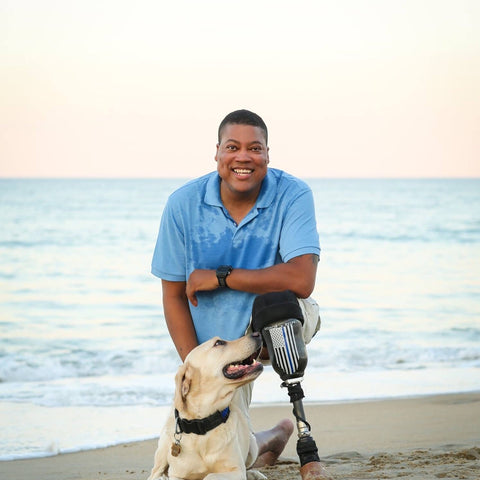
Fast forward to 2019, and here we are again, having another conversation with Brandon. This time it’s about partnering with him on compression socks. Initially, we were working on an idea to develop a sock that could be worn primarily by para-athletes. The idea started after sharing Alex Douglass’s story on our blog page. Alex was wounded in the line of duty back in 2014 and after 19 surgeries, was diagnosed with a condition called drop foot in his right leg and foot. Due to his condition sustained by his injuries, Alex underwent surgery that involved below the knee amputation on his right leg. Knowing the stories of both of these men, we thought it would be a good idea to pair both Brandon and Alex together to help us work on this new project. The two of them shared some similarities and we felt their input would be important to the success of the sock that we planned on introducing at Police Week this year. Both Alex and Brandon were wounded in the line of duty, both are para-athletes, both amputees, and both of them wear compression socks. Due to health complications, Brandon wears his compression sock every day, where Alex typically wears his only when he works out.
Growing up in Maplewood, New Jersey, Brandon enjoyed playing a lot of different sports and considered himself to be an athlete. He also had dreams of becoming a police officer and felt a calling to serve at a very young age. As a child, Brandon remembers fighting high fevers and severe joint pain. For many years the doctors speculated he was suffering from a form of juvenile arthritis. It wasn’t until he was 21 and already in college when he was diagnosed with systemic lupus, a chronic autoimmune disease. Lupus can affect many different body systems, including the joints, skin, kidneys, blood cells, brain, heart, and lungs. Some of the symptoms of this disease are chronic fatigue, pleurisy, high fevers, restlessness, and even loss of kidney function. To make matters even more complicated, he found out he had Primary Addison’s disease, and a rare blood clotting autoimmune disorder called Antiphospholipid syndrome. There is no cure for Brandon’s condition but the treatments he receives helps control the symptoms and helps minimize the flare-ups, all of which, has improved the quality of his life.
During your lifetime, you may encounter many forms of bad news at separate times. Unfortunately, Brandon experienced them simultaneously. This could have turned his world upside down, and at times he said it felt like it did, but he had to learn to manage the challenges and take the necessary steps to tackle the mountains ahead. He was determined not to let his condition define him or distract him from realizing his dreams.
He went on to finish college and became a police officer for the Salisbury, Maryland Police Department in 1996. He served for 4 years until he sustained an injury in the line of duty that only made his lupus symptoms worse, causing severe blood clots. Even a scratch on the leg caused an open wound where infection could easily set in. After dealing with complications from lupus, he found it difficult to continue working as a police officer. With a heavy heart, he left the police force taking on different jobs as an underwriter and a private investigator. He did this for 10 years until he decided to go back to school and become a physician’s assistant. He was again hit with another blow and got a blood clot in his leg while finishing the last prerequisite class. This put him in the hospital.
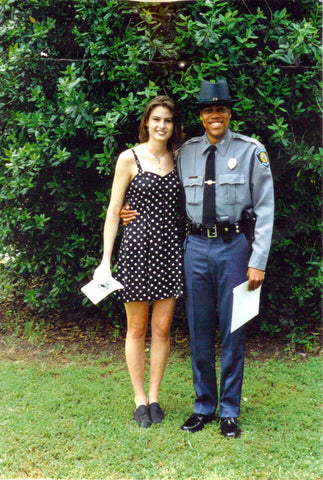
Brandon was now faced with the hardest challenge of his life. After spending four months in the hospital battling blood clots, and undergoing wound care, the doctors told him they needed to amputate his left leg below the knee. Receiving this kind of news triggered a seemingly endless spiral of negative emotions for Brandon. Trying to resist his dark emotions, he became depressed and felt he had nowhere to turn and no one he could talk to. He remembers those moments as a time where he wished he had someone who shared his experiences, but he didn’t. He felt that he wasn’t offered the right coping skills to deal with his new reality. He became even more depressed and was told by his doctors that he was suffering from Bipolar disorder, formerly known as manic depression.
After being released from the hospital, depressed and unsure if he would ever walk again, he was determined to find out how to participate as an athlete who was now an amputee. He knew from all the years of training while playing sports, that keeping active would help ease his depression and that performing low-impact exercises would offer long-lasting benefits for his lupus. Persevering and pushing through the pain, he learned about the Challenged Athletes Foundation (CAF) based out of San Diego California. CAF is a non-profit that supports and provides opportunities for people who have physical challenges, helping them to lead an active lifestyle that would allow them to compete in events. One year after his surgery, CAF awarded Brandon a grant that offered him to travel and attend their annual Extremity Games. Extremity Games are extreme sports events and adaptive sports competition for athletes with disabilities. During the events, he saw athletes with amputations, spinal cord injuries, all of which, were excelling in sports. These athletes were rock climbing, kayaking, mountain biking, and surfing. He took from this experience a realization that he could still compete as an athlete and regain his purpose.
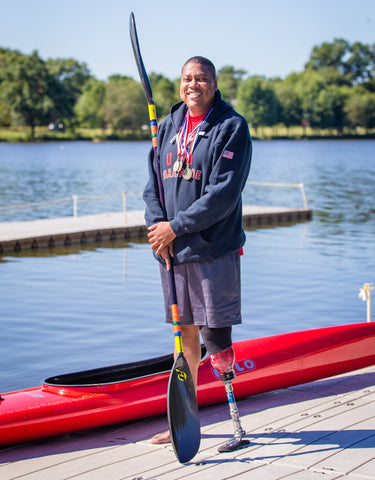
Brandon took up the sport of kayaking and found that he loved being on the water. He said it gave him a sense of peace, which was something he hadn't felt in a long time. His competitive nature was restored and he began training for the national championships. This lead to cross training in other sports and finding a new calling. He started working with the Athletes with Disabilities Network along with coaching and mentoring adults with disabilities. He enjoyed his work with other disabled athletes and decided to organize a nonprofit called Athletes with Disabilities Network Northeast that provides mentoring and outreach to disabled veterans, first responders, youth and adults in his area.
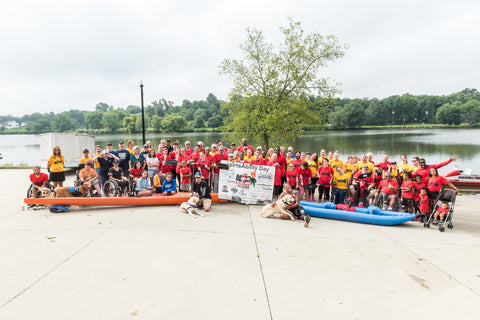
Brandon describes himself as a competitive para-athlete who likes to compete in paracanoe. Paracanoe is the Paralympics version of racing spring kayaks. In 2016, he was a Team USA Paracanoe team member, which then led him to compete for a spot to represent the USA at the 2016 Paralympics. He holds seven US national sprint titles and is working on qualifying to compete for a spot on the 2020 Paralympic team.
Brandon has learned that one of the hardest things to ask for, is to ask for help when you’ve always been the helper. His uphill climb has been a long journey. He’s had to fight through 10 heart attacks, clots in his lungs, and skin grafts. Thanks to the love of his family, he gained power through his passion for adaptive sports. His service dog, Dyson has truly been a lifesaver and only enhanced his appreciation for Susquehanna Service Dogs. These dogs are trained to help assist children and adults with a disability to become more independent. Dyson truly has provided Brandon with more freedom and independence far beyond what he had ever imagined. He has experienced so many positive changes by having Dyson around. This includes an increase in his activity level and more importantly, a great source of emotional support.
Dyson will be retiring soon, and a new canine companion will be joining Brandon. His plan moving forward is to start K9 training with his new service dog named Valor as a working K9 unit. Through the graciousness and support of the 14th Hour Foundation and Kris Paronto (aka ‘Tanto’), Valor was purchased for Brandon to take with him to training. The 14th Hour Foundation supports individuals that have served and sacrificed to protect our American Homeland. Kris, the founder of the Foundation, was a U.S. Army Ranger and CIA security contractor who was part of the CIA annex security team in 2012. Kris served on the U.S. rescue team in Benghazi that helped rescue more than 20 Americans during an attack that killed four Americans, including U.S. Ambassador J. Christopher Stevens. Brandon met Kris Paronto at a policeman’s awards dinner, where Kris was a keynote speaker. This encounter sparked Brandon’s inspiration to start his own foundation. He contacted Kris about the 14th Hour Foundation and Kris responded the next morning. He was amazed Kris remembered him and describes Kris as a down to earth, funny, yet humble man. They continue to stay in contact to this day.
Our team at Thin Blue Line USA was truly moved by Brandon and we are motivated to share his story. His training starts in May 2019 and his Detection Dog Trainer Course at the Logan Haus Kennels begins the following month, in June. Master Trainer, Mike Suttle, and owner of Logan Haus Kennels will be one of the trainers that Brandon has the opportunity to work with. It’s crucial that Brandon attend Mike’s training since it’s the only class offered for the entire year. Mike is one of the highest caliber trainers in the United States and has dedicated the past 20 years solely on working with military and police dogs. If Brandon gets the opportunity to complete his training in May and June, it will allow him to take his explosive dog team odor recognition testing and start working again as a handler and trainer.
We want to help Brandon share his story after our journey began with him in 2016. He thought he had secured the funding for the training classes but the state vocational rehab has run out of funds. The costs of this K9 training is $11,774.00 and without the help of supporters and their gift donations, he will not be able to pursue his efforts to work in this field. Since he only has a short time left to raise the funds he needs, he is reaching out for help so that he can serve again and make a difference. He wants to start working again and give back to the community in a positive way outside of para-sports. Through this training, he will be able to work as an Explosive Detection contractor which would provide him with a steady income and the ability to continue his community service efforts through his non-profit.
If you were moved by Brandon’s story and want to help him fulfill his dream to serve again, please head to his fundraiser page. From all of us at Thin Blue Line USA, thank you.1 Response
CHARLES MILLS
MAY GOD BLESS YOU BROTHER…LOVE YOU MAN.
Leave a comment
Comments will be approved before showing up.

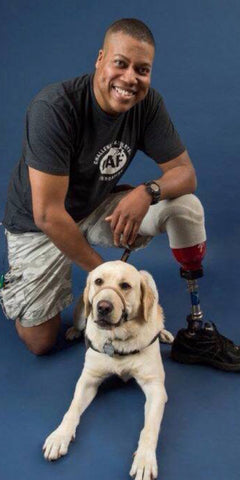
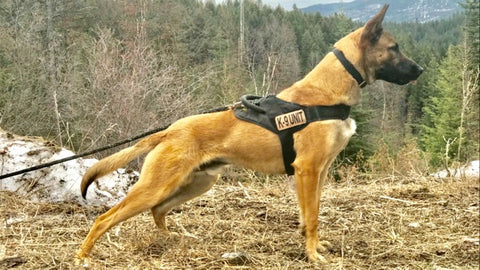




Linda Searles
Author